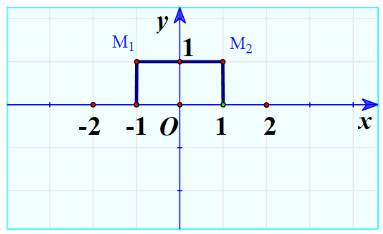Hãy nhập câu hỏi của bạn vào đây, nếu là tài khoản VIP, bạn sẽ được ưu tiên trả lời.

a) Ta có:
\(f\left( 1 \right) = 1 + 1 = 2\)
\(f\left( 2 \right) = 2 + 1 = 3\)
\( \Rightarrow f\left( 2 \right) > f\left( 1 \right)\)
b) Ta có:
\(f\left( {{x_1}} \right) = {x_1} + 1;f\left( {{x_2}} \right) = {x_2} + 1\)
\(\begin{array}{l}f\left( {{x_1}} \right) - f\left( {{x_2}} \right) = \left( {{x_1} + 1} \right) - \left( {{x_2} + 1} \right)\\ = {x_1} - {x_2} < 0\end{array}\)
Vậy \({x_1} < {x_2} \Rightarrow f\left( {{x_1}} \right) < f\left( {{x_2}} \right)\).

a) Thay \({x_1} = - 1;{x_2} = 1\) vào \(y = {x^2}\) ta được:
\({y_1} = f\left( { - 1} \right) = {\left( { - 1} \right)^2} = 1\)
\({y_2} = f\left( 1 \right) = {1^2} = 1\)
b) Ta có \({x_1} = - 1;{y_1} = 1 \Rightarrow {M_1}\left( { - 1;1} \right)\)
Ta có: \({x_2} = 1;{y_2} = 1 \Rightarrow {M_2}\left( {1;1} \right)\)
Biểu diễn trên mặt phẳng:


b, Ta có : \(0\le x\le1\)
\(\Rightarrow-2\le x-2\le-1< 0\)
Ta có : \(y=f\left(x\right)=2\left(m-1\right)x+\dfrac{m\left(x-2\right)}{\left(2-x\right)}\)
\(=2\left(m-1\right)x-m< 0\)
TH1 : \(m=1\) \(\Leftrightarrow m>0\)
TH2 : \(m\ne1\) \(\Leftrightarrow x< \dfrac{m}{2\left(m-1\right)}\)
Mà \(0\le x\le1\)
\(\Rightarrow\dfrac{m}{2\left(m-1\right)}>1\)
\(\Leftrightarrow\dfrac{m-2\left(m-1\right)}{2\left(m-1\right)}>0\)
\(\Leftrightarrow\dfrac{2-m}{m-1}>0\)
\(\Leftrightarrow1< m< 2\)
Kết hợp TH1 => m > 0
Vậy ...
\(x^2-2\left(m-1\right)x-m^3+\left(m+1\right)^2=0\)
Để pt có hai nghiệm thỏa mãn
\(\Leftrightarrow\left\{{}\begin{matrix}\Delta\ge0\\x_1+x_2=2\left(m-1\right)\le4\end{matrix}\right.\)\(\Leftrightarrow\left\{{}\begin{matrix}m\left(m-2\right)\left(m+2\right)\ge0\\m\le3\end{matrix}\right.\)\(\Rightarrow\left\{{}\begin{matrix}m\in\left[-2;0\right]\cup\left(2;+\infty\right)\cup\left\{2\right\}\\m\le3\end{matrix}\right.\)\(\Rightarrow m\in\left[-2;0\right]\cup\left[2;3\right]\)
\(P=x^3_1+x_2^3+x_1x_2\left(3x_1+3x_2+8\right)\)
\(=\left(x_1+x_2\right)^3-3x_1x_2\left(x_1+x_2\right)+3x_1x_1\left(x_1+x_2\right)+8x_1x_2\)
\(=8\left(m-1\right)^3+8\left(-m^3+m^2+2m+1\right)\)
\(=-16m^2+40m\)
Vẽ BBT với \(f\left(m\right)=-16m^2+40m\) ;\(m\in\left[-2;0\right]\cup\left[2;3\right]\)
Tìm được \(f\left(m\right)_{min}=-144\Leftrightarrow m=-2\)
\(f\left(m\right)_{max}=16\Leftrightarrow m=2\)
\(\Rightarrow P_{max}=16;P_{min}=-144\)
Vậy....

ĐKXĐ: m<>-1
Ta có: \(\Delta=\left[-2\left(m-1\right)\right]^2-4\left(m+1\right)\left(m-2\right)\)
\(=\left(2m-2\right)^2-4\left(m^2-m-2\right)\)
\(=4m^2-8m+4-4m^2+4m-8\)
\(=-4m-4\)
Để phương trình có hai nghiệm phân biệt thì -4m-4>0
hay m<-1
Áp dụng hệ thức Vi-et, ta được:
\(\left\{{}\begin{matrix}x_1\cdot x_2=\dfrac{m-2}{m+1}\\x_1+x_2=\dfrac{2\left(m-1\right)}{m+1}\end{matrix}\right.\)
\(\dfrac{x_1}{x_2}+\dfrac{x_2}{x_1}=4\)
\(\Leftrightarrow\left(x_1+x_2\right)^2-2x_1x_2=4x_1x_2\)
\(\Leftrightarrow\left(\dfrac{2m-2}{m+1}\right)^2-6\cdot\dfrac{m-2}{m+1}=0\)
\(\Leftrightarrow\left(2m-2\right)^2-6\left(m^2-m-2\right)=0\)
\(\Leftrightarrow4m^2-8m+4-6m^2+6m+12=0\)
\(\Leftrightarrow-2m^2-2m+16=0\)
\(\Leftrightarrow m^2-m-8=0\)
Đến đây bạn tự giải nhé
PT có 2 nghiệm \(\Leftrightarrow\Delta=4\left(m-1\right)^2-4\left(m-2\right)\left(m+1\right)\ge0\)
\(\Leftrightarrow4m^2-8m+4-4m^2+4m+8\ge0\\ \Leftrightarrow12-4m\ge0\\ \Leftrightarrow m\le3\)
Áp dụng Viét: \(\left\{{}\begin{matrix}x_1+x_2=\dfrac{2\left(m-1\right)}{m+1}\\x_1x_2=\dfrac{m-2}{m+1}\end{matrix}\right.\)
\(\dfrac{x_2}{x_1}+\dfrac{x_1}{x_2}=-4\\ \Leftrightarrow\dfrac{x_1^2+x_2^2}{x_1x_2}=-4\\ \Leftrightarrow\left(x_1+x_2\right)^2-2x_1x_2=-4x_1x_2\\ \Leftrightarrow\left(x_1+x_2\right)^2=-2x_1x_2\\ \Leftrightarrow\dfrac{4\left(m-1\right)^2}{\left(m+1\right)^2}=\dfrac{4-2m}{m+1}\\ \Leftrightarrow4\left(m-1\right)^2=\left(4-2m\right)^2\\ \Leftrightarrow4m^2-8m+4=16-16m+4m^2\\ \Leftrightarrow8m=12\Leftrightarrow m=\dfrac{3}{2}\left(tm\right)\)

Câu 1 :
Ta có :
\(\Delta=\left(m-1\right)^2-4.\left(2m-7\right)\)
\(=m^2-2m+1-8m+28\)
\(=m^2-10m+27>0\)
Do đó pt luôn có 2 nghiệm phân biệt

1: \(\text{Δ}=\left(-m\right)^2-4\left(m-2\right)=m^2-4m+8=\left(m-2\right)^2+4>0\)
=>Phương trình luôn có hai nghiệm phân biệt
Theo đề, ta có: m-2<0
=>m<2
2: \(\Leftrightarrow\dfrac{x_1^2+1}{x_1}\cdot\dfrac{x_2^2+1}{x_2}=9\)
\(\Leftrightarrow\dfrac{\left(x_1\cdot x_2\right)^2+\left(x_1+x_2\right)^2-2x_1x_2+1}{x_1x_2}=9\)
\(\Leftrightarrow\dfrac{\left(m-2\right)^2+\left(-m\right)^2-2\left(m-2\right)+1}{m-2}=9\)
\(\Leftrightarrow m^2-4m+4+m^2-2m+4+1=9m-18\)
\(\Leftrightarrow2m^2-6m+9-9m+18=0\)
=>2m^2-15m+27=0
hay \(m\in\varnothing\)
3: =>m=0

Để pt có 2 nghiệm trái dấu \(\Leftrightarrow3m-2< 0\Leftrightarrow m< \dfrac{2}{3}\)
Nếu \(x_1< 0\) thì \(\dfrac{1}{x_1}-3< 0\) trong khi \(\left|\dfrac{1}{x_2}\right|>0\Rightarrow\) không thỏa mãn
Vậy \(x_1>0;x_2< 0\)
Do đó:
\(\dfrac{1}{x_1}-3=\left|\dfrac{1}{x_2}\right|=-\dfrac{1}{x_2}\)
\(\Leftrightarrow\dfrac{1}{x_1}+\dfrac{1}{x_2}=3\Leftrightarrow x_1+x_2-3x_1x_2=0\)
\(\Leftrightarrow-2\left(m-1\right)-3\left(3m-2\right)=0\)
\(\Leftrightarrow m=...\)